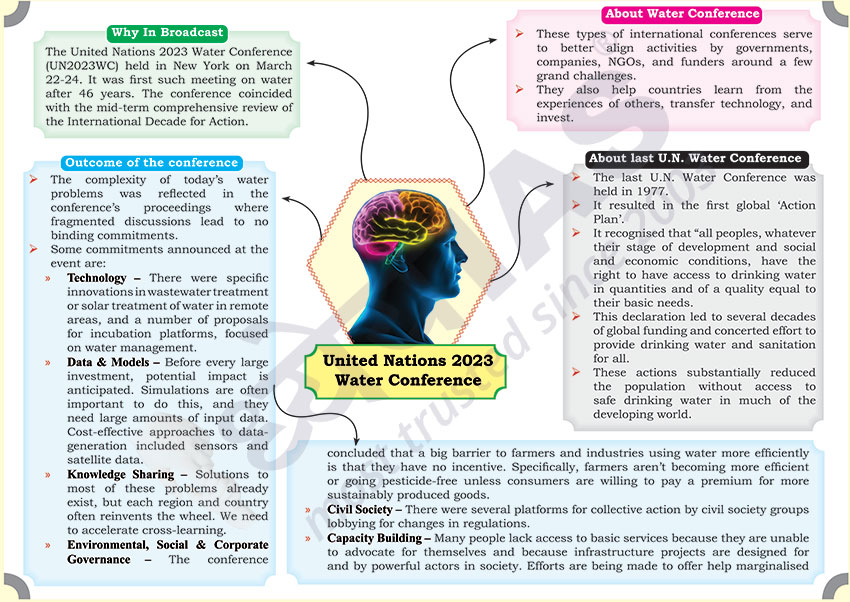Brain-booster
/
02 May 2023
Brain Booster for UPSC & State PCS Examination (Topic: United Nations 2023 Water Conference)

Why in Broadcast?
- The United Nations 2023 Water Conference (UN2023WC) held in New York on
March 22-24. It was first such meeting on water after 46 years. The
conference coincided with the mid-term comprehensive review of the
International Decade for Action.
About Water Conference
- These types of international conferences serve to better align
activities by governments, companies, NGOs, and funders around a few grand
challenges.
- They also help countries learn from the experiences of others, transfer
technology, and invest.
About last U.N. Water Conference
- The last U.N. Water Conference was held in 1977.
- It resulted in the first global ‘Action Plan’.
- It recognised that “all peoples, whatever their stage of development and
social and economic conditions, have the right to have access to drinking
water in quantities and of a quality equal to their basic needs.
- This declaration led to several decades of global funding and concerted
effort to provide drinking water and sanitation for all.
- These actions substantially reduced the population without access to
safe drinking water in much of the developing world.
Outcome of the conference
- The complexity of today’s water problems was reflected in the
conference’s proceedings where fragmented discussions lead to no binding
commitments.
- Some commitments announced at the event are:
- Technology – There were specific innovations in wastewater
treatment or solar treatment of water in remote areas, and a number of
proposals for incubation platforms, focused on water management.
- Data & Models – Before every large investment, potential
impact is anticipated. Simulations are often important to do this, and
they need large amounts of input data. Cost-effective approaches to
datageneration included sensors and satellite data.
- Knowledge Sharing – Solutions to most of these problems
already exist, but each region and country often reinvents the wheel. We
need to accelerate cross-learning.
- Environmental, Social & Corporate Governance – The conference
concluded that a big barrier to farmers and industries using water more
efficiently is that they have no incentive. Specifically, farmers aren’t
becoming more efficient or going pesticide-free unless consumers are
willing to pay a premium for more sustainably produced goods.
- Civil Society – There were several platforms for collective
action by civil society groups lobbying for changes in regulations.
- Capacity Building – Many people lack access to basic services
because they are unable to advocate for themselves and because
infrastructure projects are designed for and by powerful actors in
society. Efforts are being made to offer help marginalised.







